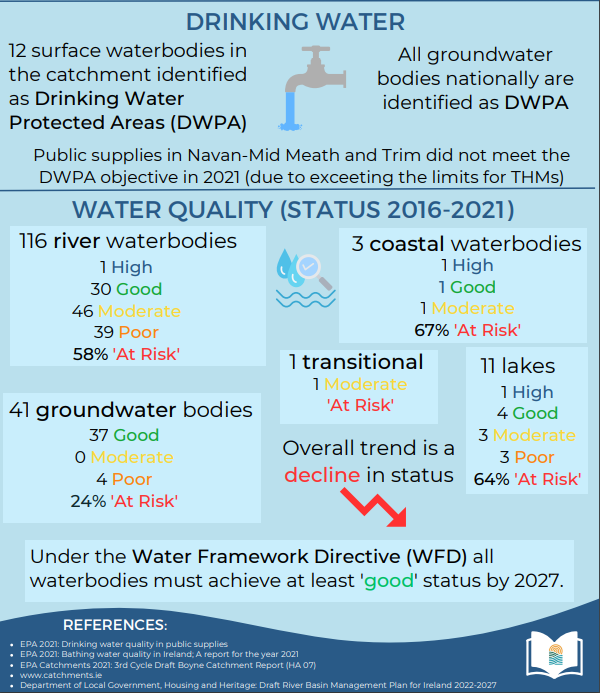Boyne Vision
A Consultation on the Future of the Boyne
Boyne Vision:
In 2023, the Boyne Rivers Trust conducted an extensive community and stakeholder-driven consultation process to gather insights and perspectives, to guide the future direction and priorities for the sustainable management of the Boyne catchment.
194 people took part through in-person focus groups in Drogheda, Navan, Trim, Kells, and Virginia, and via online surveys and one-to-one interviews. With support from LEADER and LAWPRO, we engaged a local NGO Development Perspectives from Drogheda to lead the process.
The Centre for Freshwater and Environmental Studies at Dundalk-IT conducted a detailed analysis of key data related to water quality pressures in the River Boyne.The results of this study are contained in the Boyne Vision Report.
Summary Of Key Findings
Engagement - In terms of quantity and quality, public engagement and interest in the Boyne catchment is high.
Views and values - The dominant view of the Boyne is positive with people commenting on the beauty, history and value of the Boyne. Notwithstanding this view, there are also views pointing to the decline and pollution of the Boyne.
Water quality is by some distance the priority theme, which people want to focus and action on. The residents of the Boyne catchment want a healthier, cleaner Boyne that meets the standards called for in the Water Framework directive.
Multi-stakeholder and collaborative approach - It is the view of those participating in this process that stakeholders operate too much within their own sphere of activity and do not collaborate enough.
Accountability, responsibility, and implementation of existing legislation - Participants in the focus groups felt that duty bearers and policy makers have not taken their responsibilities seriously enough.
Enforcement – Polluter pays principle – It was clear from the focus groups that there was a desire to have much stronger enforcement measures in place.
Education – Broadly speaking, more and deeper educational opportunities are needed for all residents within the Boyne catchment to understand and value the river.
Population Increase - From 1991 to 2022, the population in the 10 largest urban centres in the Boyne catchment has increased dramatically.
Access - Generally speaking, research participants felt that it was bizarre that there was very limited access to the river for leisure activities.
Overall state of the Boyne – “The Boyne Catchment remains under pressure with 51% of water bodies at Risk of not achieving ‘good status’ and failing to meet the WFD objectives” (EPA Catchments.ie, 2022).
Based on these findings, a series of recommendations is made on pages 40-42 of the Boyne Vision Report.
Funding and Partners
In 2022, the Boyne Rivers Trust applied for Leader funding, through Meath Partnership, to carry out the Boyne Vision project. Funding was awarded in November 2022 and a contribution to the cost of the project was also provided by the Local Authority Waters Programme (LAWPRO), who were also available to help the Trust during the application process. In advance of the funding application a tender process was carried out to establish the total cost of the project and to identify a suitable partner. After a very competitive tender process, the joint tender of Development Perspectives and the Centre for Freshwater and Environmental Studies in Dundalk Institute of Technology won the contract to carry out the Boyne Vision consultation.
Development Perspectives is regarded as one of the leading Global Citizenship Education organisations in Ireland. They specialise in working with the adult and community education sector. Development Perspectives is an award-winning provider of high-quality educational opportunities. They are the only organisation in the country that is fully compliant with the IDEA code of Good practice for Development Education, which speaks to the quality and associated high standards of their work. DP can also point to extensive experience of working with multi-stakeholder groups (EirGrid and the Joint Migrant Integration Forum) and partnerships (leading a strategic multi-annual partnership with Irish Aid).
DkIT is the major third-level educational establishment for the Northeast region where cutting-edge and innovative environmental research is led by researchers in the Centre for Freshwater and Environmental Studies (CFES). The centre engages in inter- and multi-disciplinary research across three main themes: Lake and Catchment Management, Organic Resources Research, and Water, Communities and Development and is currently involved in a number of large-scale projects that are addressing complex cross-disciplinary issues that have a regional, national, and international focus.
Support and Thanks:
We wish to thank all those that took part in the consultation process. We would also like to thank all partners, supporters and funders for their help during this process. Without you this would not have been possible!









